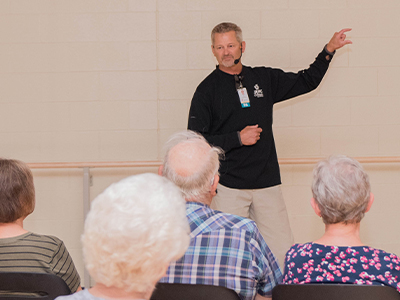“What over-the-counter medications can I try” and “When do I need a joint replacement surgery” were among the questions asked at the JRMC U: Bones, Joints & Arthritis class on June 15.
Sixty people attended the event, which helped people understand their bodies, where arthritis comes from and how to keep the musculoskeletal system as healthy as possible. Orthopedic Physician Assistant Patrick Walter presented.

With decades of experience in medicine, Walter joined the JRMC team in 2016. Originally from Bowman, N.D., Walter earned his master’s degree in Exercise Physiology from the University of Wisconsin – La Crosse and his Master of Physician Assistant Studies from the University of North Dakota in Grand Forks, N.D. The National Commission of Certification of Physician Assistants certify him.
“People should get a joint replacement if and when they are ready,” Walter said. “If your lifestyle is significantly altered, a person should probably do something. If you can still chase the grandkids and work in the yard, maybe we can start with conservative options like medication or physical therapy.”
Walter sees patients of all ages for care including injuries and post-operative visits. He is a member of a comprehensive team, including Orthopedic Surgeons Dr. Michael T. Dean and Dr. Timothy Volk, as well as Podiatrists/Foot & Ankle Surgeons Dr. Kayla Emter and Dr. Rachael Renschler.
Another JRMC U question included arthritis – where does it come from and what is it made of?
That depends on the type of arthritis, Walter said.
Some arthritis is the result of natural wear and tear. Other types of arthritis come from autoimmune diseases, inflammatory conditions or genetics. He said that treatment depends on the type of arthritis, including medications, physical and occupational therapy and joint surgery, he said.
Nationwide, about 25% of U.S. adults have an arthritis diagnosis.
“Each arthritis diagnosis is different and so the treatment for them varies too,” Walter said.
JRMC Orthopedics specializes in diagnosing and treating bones, joints, ligaments, tendons, muscles and nerves. The specialty includes procedures such as total joint replacements of hips, knees and shoulders as well as knee arthroscopy, shoulder arthroscopy and fracture repair.
Other questions from the JRMC U:
What is the best way to manage pain?
People have several options when it comes to pain management, Walter said. Each individual will find success with different treatment options. Some include over-the-counter pain medication. Gels like diclofenac (brand name: Voltaren) are available at most drug stores. If those don’t work, JRMC Orthopedics can offer therapy, injections and surgical options.
What supplements should I try?
That depends on the individual, Walter said. However, a well-balanced diet, exercise and managing weight are great places to start. Calcium and Vitamin D are important to bone health. He warned about overdoing supplements, as they may do more harm than good.
What is a DEXA scan and when do I need one?
Providers often recommend DEXA scans to test for osteoporosis or thinning of the bones. The scan uses low-dose x-rays to take measurements to determine the strength of a person’s bones. JRMC offers DEXA scans in its radiology department. The test takes about 10 – 20 minutes. DEXA scans are recommended for women who are:
- 65 years old or older
- 50 to 64 with certain risk factors
Because men have a higher bone mass and lose bone more slowly than women, they’re at a lower risk of fracture.
JRMC U classes offered monthly
- Wednesday, July 12: JRMC U: Kick Out Kidney Stones, featuring Urologist Dr. Brent Williams
- Thursday, August 17: JRMC U: Dizziness & Vertigo, featuring Ear, Nose & Throat Specialist Dr. C.P. Barton III
All events are set for 11 a.m. at TRAC. Attendees do not need to be TRAC members to attend. The event is free, open to the public and JRMC will provide a light lunch.


